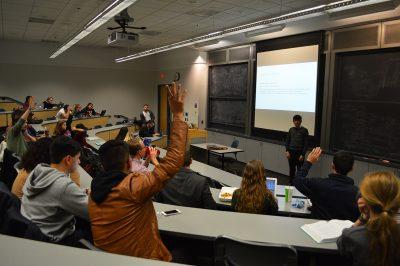
By Noor Adatia and Caroline Hitesman
The Boston University Student Government voted Monday evening to pass a proposal that removes seven Senate seats currently allotted to student groups, including the Environment Student Organization, BU Hillel, InterFraternity Council, Panhellenic Council and the Student-Athlete Advisory Committee. It replaced these seats with 10 “at-large” seats, in which student groups can earn one of these seats through elections.
Presented by the Rules Committee at the last Senate meeting of the semester, the proposal also allotted one Senate vote for every 500 undergraduate students enrolled in each BU college. This would increase Senate seats for all colleges from 21 to 32 seats.
While presenting the proposal, College of Arts and Sciences Sen. Zachary Treichel said the proposal is to ensure a more democratic SG and to avoid overrepresentation.
“This is a very important part of democracy, and every democracy is one person, one vote, so one student, one vote,” the CAS senator said.
The proposal stated that a Questrom School of Business student who is also in a fraternity, part of Hillel and plays BU basketball would have four representative votes in Senate, whereas another student in the College of Engineering would only have one.
The proposal was one of the most controversial yet this semester, and debate lasted for over a half an hour until the proposal passed with 95 percent of the vote yays and 5 percent nays.
Executive Vice President and President-elect SaraAnn Kurkul said she was excited about this change as it advances the platform of next year’s executive board.
“We’re able to get more voices heard, more student outreach and more student engagement, which is something that we really have been working hard for in [Your BU’s] campaign, and building community, which is what [Your BU] has been campaigning for,” the College of Communication junior said after the meeting.
Kurkul added that she thinks this will help with Senate’s mission of representing and advocating for all students.
Sydney Berman, a Hillel senator, said that abruptly restructuring senate was frustrating to student groups that are trying to advocate on behalf of their constituents.
“I think it’s a little weird, just because Senate hasn’t really done anything important this year, in my opinion,” Berman said after the meeting. “I think it’s kind of frustrating how they’re trying to take seats away from students who actually want to be involved. I totally understand the new structure that they want, getting everyone a vote. That makes sense to me, but we’re not really voting on things that matter.”
Berman added that she hopes with next year’s new structure, Senate will be able to tackle issues outside of SG that target the student body’s needs.
“All we’ve been voting on is Senate’s rules about Senate and not doing stuff that helps the students who go to school here,” the Questrom sophomore added. “[In the future], I’d like to see Senate do that.”
Senate Chair Dan Collins said his journey as senate chair has been better than he initially hoped for.
“When I ran as senate chair, I ran on a platform of reform, change, efficiency in meetings and sending a message to the administration that we can and will use the power that we have to help students, and we accomplished that above and beyond anything I could have imagined,” the CAS junior said after his final meeting.
Collins added that this last meeting was especially productive.
“The bylaws, the constitutions were completely overhauled, and that’s not a small task,” he said. “We reformed the structure of Senate, we spent every cent of our tens of thousands of dollars and all were directly given to student groups.”
Some senators said they think the new Senate structure will be better for SG in the long term.
ENG Sen. Nehemiah Dureus said the changes provide fair representation.
“I think it’s an even better solution and for minority groups to have representation on SG, and it allows people to be more involved on SG, since now you can have Alianza Latina and African-American groups and other groups to actually get involved,” the ENG sophomore said. “I think honestly at the end of the day, it’s going to be a net positive for SG moving forward and reaching out to students.”
Senate Chair-elect Octavio Vidal said amid the massive structural changes, he anticipates the Senate will run smoothly next semester.
“My goal is to make this keep running this as efficiently as possible because the only thing way senate can continue to make the conversations,” the IFC senator said. “We want to make sure that we’re doing everything we can to do just push senate forward.”



















































































































John Sand • May 4, 2017 at 10:19 am
Well, will you look at that. Jake Brewer actually accomplished something that didn’t involve shutting down SG funding. Pretty sure this’ll embolden SAS/SJP.
Abraham Berman • May 2, 2017 at 10:52 am
I think this is the right move too, but those were the wrong groups to take representative from. Athletes have an incredibly important opinion, maybe not on all topics, but on a lot of things in terms of school spirit, community, finances, and it is probably the most common type of extracurricular. And does Hillel not represent a group of minorities as well? Hillel creates a sense of community, belonging, and plans a ton of events. Taking their representation away absolutely contradicts the idea of bringing in more minority groups.